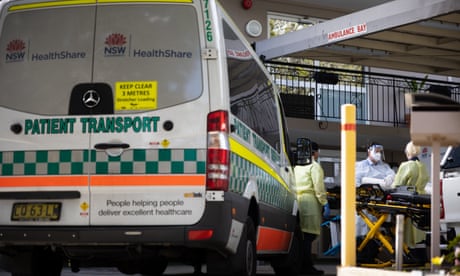When it comes to deflecting inconvenient questions, the prime minister has all the moves.
Last modified on Tue 1 Feb 2022 20.46 AEDT
Scott Morrison has kicked the political year off with an address to the National Press Club after which he faced a barrage of questions about the government’s handling of the pandemic and poor standing in the opinion polls.
Politicians often answer the question they wish they’d been asked – not the one that was actually asked – and Morrison’s Q&A was a classic of the genre.
So where did Morrison’s answers fall short?
1. Is it too late now to say sorry?
The ABC’s Laura Tingle asked if the prime minister would like to “take this opportunity to actually say sorry for the mistakes you’ve made as prime minister”.
Morrison replied: “We’re all terribly sorry for what this pandemic has done to the world and to this country.”
See what he did there? He shifted the apology from its intended subject – his mistakes – and on to something arguably outside his control.
Earlier, Morrison had said accepting responsibility means to challenge yourself with questions like “couldn’t this have been avoided”.

In answer to Tingle, Morrison admitted being too optimistic about the summer and said he wished he’d sent in the military to fix the vaccination rollout sooner.
But asked again if he would apologise, sorry seemed the hardest word. “I think I’ve explained my answer fairly fully,” he said.
2. Aged care
Guardian Australia’s Katharine Murphy asked why errors keep being made in the handling of outbreaks in aged care, resulting in more than 400 deaths since January.
Morrison replied that by now 99% of aged care centres had been visited and residents offered booster shots, then filibustered by giving statistics about personal protective equipment. Nothing about the settings in place before those deaths, when many residents were still not boosted.
The Seven Network’s Mark Riley asked why the Morrison government wouldn’t join a Fair Work Commission case in which unions are seeking a pay rise in the sector.
Morrison said: “There’s a process under way, and we will let that process follow its course. And we’ll, of course, have to absorb any decision that is taken there.”
So, aged care workers will get bonus payments of up to $800, but no answer as to why the government won’t be involved in the case seeking a permanent pay rise, as the royal commission, industry and unions have asked it to do.
3. The hip pocket
Sky’s Andrew Clennell asked about economic supports and added a gotcha question by asking for the price of bread, petrol and rapid antigen tests.
Morrison replied: “I’m not going to pretend to you that I go out each day and I buy a loaf of bread and I buy a litre of milk.”
Of course, Morrison was asked the price – not whether he bought it himself.
On economic support, the answer wasn’t much better: “First of all, during the pandemic, you can’t pay for everything. Because it all has to be paid for.”
4. Rapid tests
Nine newspapers’ David Crowe asked why the federal government didn’t order more rapid antigen tests, given the risk of future variants and more cases.
Morrison responded that the Therapeutic Goods Administration had approved many tests and was working with local producers, but was on less sure footing when trying to explain why more weren’t ordered.
Morrison said “the medical advice to the government was not to use rapid antigen tests” because Australia had so few cases that we could use the more accurate PCR tests.
Morrison said:
The reason for that is that we were in Delta. And we were focused on getting the vaccinations in place because that is what would prevent the transmission … What happened with Omicron is that it flipped it completely. And it did it within a matter of weeks. And so, there had been no suggestion that rapid antigen tests from any official health advisers to the government was something as a priority over children’s vaccinations, over the booster shots.
5. Poll questions lead to standard stump
Two questions noted the government’s poor standing in the polls and queried why Morrison was best to lead the Coalition (Andrew Probyn from the ABC) and how he could catch up to the Labor leader, Anthony Albanese (Greg Brown from the Australian).
On the first, Morrison replied that he trusted the Australian people, who would make “careful judgments” before they made “a decision that has consequences” by changing the government.
But in a long answer making comparisons between himself and Labor on national security and other issues, Morrison didn’t touch the sides of the question about why he should be leading the Coalition – as opposed to, for the sake of an argument, Peter Dutton.
No comments:
Post a Comment